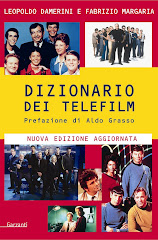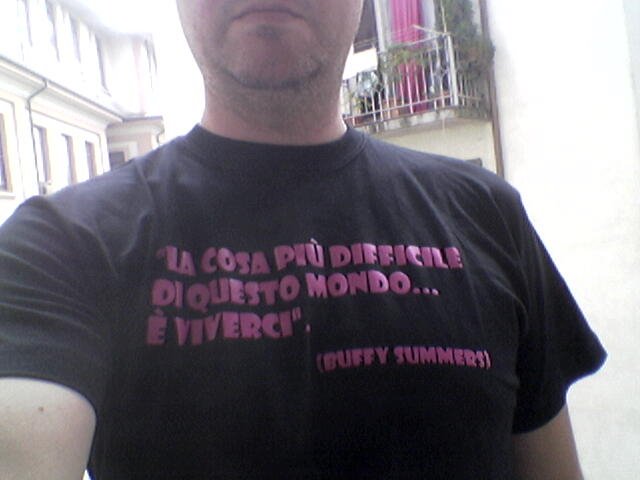NEWS - Clamoroso al Cibali! No, Tony Soprano non è morto...
News tratta da Vox.com
Instead of giving Tony a final scene in which he is either killed or
arrested — the two possible fates Tony and his fans had imagined for him
— the last episode ends unexpectedly during a domestic scene with an
ominous tinge. Tony (James Gandolfini), his wife (Edie Falco), and his
son (Robert Iler) are waiting for his daughter, Meadow (Jamie-Lynn
Sigler), to join them for dinner at a popular restaurant, while a number
of suspicious characters mill around. Outside, Meadow burns rubber
trying to get into a parking space and then runs across a street against
the light as cars whiz by her. Inside, Tony raises his head, and — CUT
TO BLACK. Millions of television sets across America went dark and
silent suddenly. Is my television broken? we wondered, each in our individual homes. At THIS moment? Then the credits rolled, and all hell really broke loose. Are you kidding me? This is the end?
What did it mean? Was this Chase's way of artfully — or
contemptuously, depending on your opinion of Chase’s attitude toward his
audience — creating Tony's death? Some recalled that Bobby Baccalieri,
Tony's brother-in-law, once said that when the bullet with your name on
it arrived, you probably didn't hear it coming. The questions have not
yet stopped since the episode aired in June 2007.
Chase, he wouldn't tell. For him, that kind of obsession is as misguided
as asking, "What happened to the Russian in 'Pine Barrens'?" — a
reference to a season-three episode in which two men in Tony's crew,
Christopher Moltisanti and Paulie Walnuts, drive a Russian mobster they
have severely beaten up to the snow-covered New Jersey Pine Barrens to
kill and dispose of him. Moltisanti and Walnuts are stunned when the
Russian not only musters the energy to escape, but also disappears
without a trace in a hail of bullets as they try to recapture him. It's
an early "did he die?" series moment. In response to audience agitation
to know what became of the mobster, and even the lobbying of Terry
Winter, who wrote the episode, to give the incident closure in a
subsequent episode, Chase replied, "I don't give a fuck about the
Russian." Chase clearly meant that disappearance to be one of life's
loose threads.
I had been talking with Chase for a few years when I finally asked
him whether Tony was dead. We were in a tiny coffee shop, when, in the
middle of a low-key chat about a writing problem I was having, I popped
the question. Chase startled me by turning toward me and saying with
sudden, explosive anger, "Why are we talking about this?" I answered,
"I'm just curious." And then, for whatever reason, he told me. And I
will tell you. So keep reading.
My earliest fascination with Chase, was, unsurprisingly, a result of The Sopranos,
which led me to a couple of interviews with him at Silvercup Studios in
2005, for a book about gangster films I have long since published. And
we have continued to exchange ideas through e-mails and discussions at
Upper East Side coffee bars and restaurants. When you're across the
table from him, he makes an impression without making a commotion. He
oscillates between intense verbal pyrotechnics, laughter, and silences,
which might mean "I am listening to you" or "I am thinking." He is
forthcoming, but tends to maintain a reserve about his own work,
insisting that if he could say what it means then he wouldn't have to
write it. He's right, of course. All the same, he and I both think there
is value in conversations between artists and critics; ours remains in
progress.
On occasion he breaks his reserve, but makes it clear that I am not
to write about anything he says that is an interpretation of his own
work, since he believes that the art of entertaining is leaving the
audience imagination to run wild. So when he answered the "is Tony dead"
question, he was laconic.
Fine. Tony's not dead. But what do we do with this bald fact? And isn't
Chase's flat response exactly the point? The mere answer doesn't really
go anywhere unless we consider it as a part of the larger context of The Sopranos, and as a part of the much bigger story of Chase's art...
Leggi il resto QUI.
venerdì 29 agosto 2014
Iscriviti a:
Commenti sul post (Atom)
"Il trivial game + divertente dell'anno" (Lucca Comics)

Il GIOCO DEI TELEFILM di Leopoldo Damerini e Fabrizio Margaria, nei migliori negozi di giocattoli: un viaggio lungo 750 domande divise per epoche e difficoltà. Sfida i tuoi amici/parenti/partner/amanti e diventa Telefilm Master. Disegni originali by Silver. Regolamento di Luca Borsa. E' un gioco Ghenos Games. http://www.facebook.com/GiocoDeiTelefilm. https://twitter.com/GiocoTelefilm
Lick it or Leave it!












.jpg)













Nessun commento:
Posta un commento